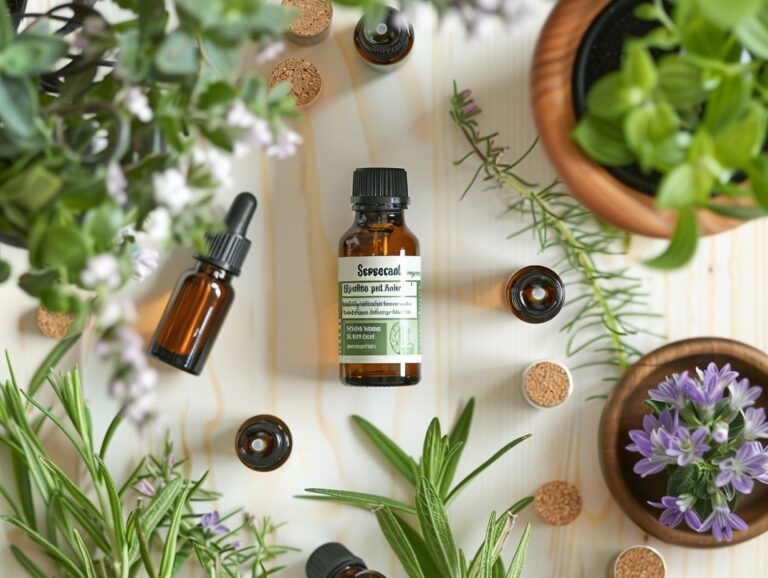Can You Get Vitamin C From Essential Oils
Essential oils have gained popularity for their various health benefits, but can they provide us with essential nutrients like Vitamin C?
We will explore the different types of essential oils and their benefits, as well as the risks of using them for Vitamin C intake. We will also discuss the best sources of Vitamin C, whether it be from food or supplements.
Learn how you can incorporate essential oils and Vitamin C into your daily routine with some easy recipes.
Key Takeaways:
What Are Essential Oils?
Essential oils are concentrated extracts derived from plants, known for their aromatic properties and various benefits in skincare and aromatherapy. These oils are typically obtained through distillation or cold pressing methods from botanical sources such as flowers, herbs, and fruits.
During the distillation process, the plant material is carefully heated to release the aromatic compounds, which are then captured and condensed into potent essential oils. On the other hand, cold pressing involves mechanically pressing the plant material to extract the oils without the use of heat, preserving their beneficial properties.
These natural ingredients are prized for their versatility and effectiveness in skincare, where they can help with various skin concerns like acne, dryness, and inflammation. In aromatherapy, essential oils are used to promote relaxation, improve mood, and enhance overall well-being.
The plant sources for essential oils are vast and diverse, ranging from familiar flowers like lavender and rose to exotic herbs like frankincense and patchouli. Fruits such as lemon and orange also yield refreshing oils that are popular for their uplifting scent and skin-rejuvenating properties.
What Is Vitamin C?
Vitamin C, also known as ascorbic acid, is a powerful antioxidant that plays a crucial role in skincare by protecting the skin from environmental stressors, promoting collagen production, and enhancing overall skin health. It is commonly found in various skincare products and natural ingredients like citrus fruits and rosehip oil.
This essential nutrient acts as a shield for the skin, combatting free radicals that can accelerate aging and cause damage. By neutralizing these harmful molecules, Vitamin C helps prevent fine lines, wrinkles, and other signs of premature aging. Its ability to stimulate collagen synthesis is key in maintaining skin elasticity and firmness.
Incorporating Vitamin C into your skincare routine can lead to a brighter complexion, reduced hyperpigmentation, and improved skin texture. Whether applied topically or consumed through diet, the benefits of Vitamin C extend beyond aesthetics, contributing to a healthier, more resilient skin barrier.
How Much Vitamin C Do You Need?
The recommended daily intake of Vitamin C varies depending on factors like age, gender, and overall health. For optimal skin health and collagen production, experts suggest a daily dosage of Vitamin C to combat the effects of environmental stress and promote skin regeneration.
Vitamin C plays a crucial role in the synthesis of collagen, a protein that helps maintain skin elasticity and firmness. Studies have shown that Vitamin C can help reduce sun damage and wrinkles, making it a valuable asset in skincare routines. To achieve noticeable benefits, aim for a recommended dosage of around 75-90 milligrams per day for adults, although this amount may vary based on individual needs and skin concerns. By incorporating Vitamin C-rich foods or supplements into your daily routine, you can harness its antioxidant properties to support a healthy, glowing complexion.
Can You Get Vitamin C from Essential Oils?
While essential oils contain various beneficial compounds, they are not a direct source of Vitamin C as it is primarily found in citrus fruits and other Vitamin C-rich foods. Essential oils like rosehip oil, sea buckthorn, and lemon oil offer different skincare benefits apart from Vitamin C.
Therefore, it’s crucial to understand that while essential oils can enhance skincare routines, they do not substitute the essential nutrient that Vitamin C provides to our skin. For optimal skin health, incorporating a diet rich in Vitamin C through fruits such as oranges, strawberries, and kiwis is vital.
Regarding skincare benefits, rosehip oil is known for its anti-aging properties due to its high levels of antioxidants and essential fatty acids. This oil can help improve skin elasticity and reduce the appearance of wrinkles.
On the other hand, sea buckthorn oil is praised for its ability to promote skin hydration and elasticity, thanks to its rich vitamin and mineral content. It can also help soothe irritated skin and support natural collagen production.
What Are the Different Types of Essential Oils?

Essential oils come in various types, including citrus oils like lemon oil, and contain compounds such as monoterpenes that contribute to their aromatic and therapeutic properties. Each type of essential oil offers distinct benefits for skincare and aromatherapy.
Among citrus oils, lemon oil stands out for its invigorating and uplifting aromatic properties. Its high concentration of monoterpenes like limonene makes it ideal for clarifying the skin and reducing blemishes. On the other hand, orange oil, with its sweet and fruity scent, boasts a calming effect, perfect for relaxation and stress relief.
What Are the Benefits of Essential Oils?
Essential oils provide a range of benefits in skincare products, including antioxidant properties that help combat oxidative stress, promote collagen production, and improve skin hydration. Incorporating essential oils like marula oil, sunflower oil, and baobab oil can enhance the efficacy of skincare formulations.
Antioxidants found in essential oils play a crucial role in protecting the skin from damage caused by free radicals, delaying signs of aging and maintaining a youthful appearance. These potent compounds not only neutralize harmful free radicals but also stimulate collagen synthesis, essential for maintaining skin elasticity and firmness.
Marula oil, renowned for its moisturizing and rejuvenating properties, deeply hydrates the skin without clogging pores, making it suitable for all skin types. On the other hand, sunflower oil, rich in vitamin E and fatty acids, helps strengthen the skin barrier, locking in moisture and promoting a glowing complexion.
What Are the Risks of Using Essential Oils for Vitamin C?
While essential oils offer numerous benefits, there are misconceptions about their ability to provide Vitamin C directly. Some skincare myths suggest that essential oils alone can replace the benefits of Vitamin C, which may lead to inadequate skincare practices and misinformation.
It is important to understand that essential oils do not contain significant amounts of Vitamin C to effectively boost skin health. Vitamin C is a potent antioxidant that plays a crucial role in brightening and protecting the skin from environmental damage. Relying solely on essential oils for Vitamin C intake in skincare may not provide the desired results and could potentially lead to a lack of proper nutrients essential for skin rejuvenation.
Therefore, it is advisable to incorporate Vitamin C-rich skincare products like serums and moisturizers into your routine to ensure you are reaping the full benefits of this essential nutrient for a vibrant and healthy complexion.
Are Essential Oils Safe for Ingestion?
Ingesting essential oils, especially citrus essential oils like lemon oil, should be approached with caution due to their high concentration and potential adverse effects on internal organs. It is advisable to consult a healthcare professional before consuming essential oils for internal use.
Regarding ingestion, the potency of essential oils can have a significant impact on the digestive system and other organs. Citrus essential oils, in particular, contain compounds that can be harsh on the stomach and liver if not diluted properly. The high concentration of these oils increases the risk of adverse reactions such as nausea, heartburn, or even liver damage.
Safe usage of essential oils internally involves diluting them in a carrier oil or water to reduce their intensity. It’s important to follow recommended guidelines for dosages and not exceed the suggested amounts. Seeking guidance from a qualified healthcare professional, such as a naturopath or aromatherapist, is crucial to ensure the proper and safe consumption of essential oils.
Can Essential Oils Cause Allergic Reactions?
Essential oils have the potential to cause allergic reactions, especially in individuals with sensitive skin or specific allergies. Before using essential oils, it is essential to perform a patch test to determine skin sensitivity and mitigate the risk of adverse reactions.
A patch test involves applying a small amount of diluted essential oil to a discreet area of the skin, such as the inner forearm or behind the ear, and observing for any adverse reactions over the next 24-48 hours. This simple test can help identify potential skin sensitivity or allergies before full application. If redness, itching, swelling, or irritation occurs, it is crucial to discontinue use immediately and wash the area with mild soap and water.
What Are the Best Sources of Vitamin C?

Citrus fruits like oranges, lemons, and grapefruits are excellent natural sources of Vitamin C, vital for maintaining healthy skin and promoting collagen synthesis. Including Vitamin C-rich foods in your diet can significantly contribute to overall skin health and vitality.
Other top sources of Vitamin C include strawberries, kiwis, and bell peppers, which are also packed with this essential nutrient.
The role of collagen synthesis in skin health cannot be overstated as it helps in maintaining skin elasticity and firmness. Regular consumption of Vitamin C-rich foods can aid in protecting the skin from damage caused by free radicals, thereby reducing signs of aging and promoting a youthful appearance.
Can You Get Enough Vitamin C from Food?
Meeting your daily Vitamin C requirements through a balanced diet rich in fruits and vegetables is essential for obtaining a sufficient amount of antioxidants to protect the skin from oxidative damage and maintain optimal health. Including Vitamin C-rich foods like bell peppers and strawberries can enhance your skin’s natural defenses.
Vitamin C, a powerful antioxidant, plays a crucial role in neutralizing free radicals that lead to premature aging and skin damage. By incorporating bell peppers and strawberries into your diet, you not only boost your skin’s defense mechanism but also support overall wellness. These vibrant fruits also aid collagen production, promoting skin elasticity and firmness. Vitamin C aids in wound healing and helps combat sun-induced skin aging.
What Are the Benefits of Taking Vitamin C Supplements?
Vitamin C supplements can be beneficial for individuals who have difficulty meeting their daily Vitamin C needs through diet alone. These supplements provide a convenient way to ensure adequate antioxidant intake, supporting collagen production, and enhancing skin hydration for overall skin health.
For those with dietary restrictions or preferences that limit the consumption of Vitamin C-rich foods like citrus fruits and leafy greens, these supplements become even more essential. By taking Vitamin C supplements, individuals can bridge the gap in their Vitamin C intake and maintain optimal levels of this crucial antioxidant. This not only aids in combating oxidative stress but also plays a vital role in boosting collagen synthesis, thus contributing to healthier, more youthful-looking skin.
How Can You Incorporate Essential Oils and Vitamin C into Your Daily Routine?
Integrating essential oils and Vitamin C into your daily skincare routine can enhance the efficacy of your products and promote skin health.
These key ingredients work synergistically to provide antioxidant protection, brighten complexion, and boost collagen production, resulting in radiant and youthful-looking skin.
When selecting formulations, opt for serums or moisturizers that contain stable Vitamin C derivatives like ascorbic acid or sodium ascorbyl phosphate combined with marula oil and sunflower oil for maximum benefits. The hydrating properties of these oils help maintain skin’s moisture balance while supporting the effectiveness of Vitamin C in combating free radicals and improving overall skin texture.
What Are Some Recipes for Using Essential Oils and Vitamin C?
Creating DIY skincare recipes that combine essential oils like rosehip oil and baobab oil with Vitamin C-rich ingredients can be a fun and effective way to boost your skincare routine. Homemade serums, masks, and moisturizers can provide natural nourishment and antioxidant protection for your skin.
When focusing on natural skincare, incorporating ingredients that are rich in antioxidants can help protect the skin from damage caused by environmental factors and free radicals.
For a rejuvenating serum, try blending a few drops of rosehip oil with Vitamin C-rich extracts like orange peel or camu camu.
For a hydrating mask, mix baobab oil with honey and aloe vera for a soothing and moisturizing treatment.
These DIY creations not only promote healthy skin but also allow you to personalize your skincare routine according to your skin’s specific needs.
Frequently Asked Questions
Can You Get Vitamin C From Essential Oils?
No, essential oils do not contain any significant amount of vitamin C.
What are essential oils?
Essential oils are highly concentrated plant extracts that are derived from various parts of plants.
Do essential oils have any nutritional value?
No, essential oils are not meant to be consumed and do not provide any nutritional value.
Are there any other ways to get vitamin C besides essential oils?
Yes, vitamin C can be obtained through a variety of foods such as citrus fruits, leafy greens, and supplements.
Why do some people believe that essential oils contain vitamin C?
Some people may believe that essential oils contain vitamin C because of the presence of certain compounds, but these compounds do not provide the same benefits as actual vitamin C.
Is it safe to use essential oils for their supposed vitamin C content?
No, it is not safe to rely on essential oils for vitamin C intake as they are not a reliable source and can pose potential health risks if used inappropriately.








